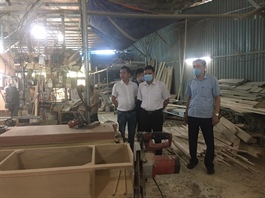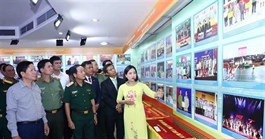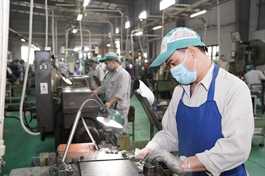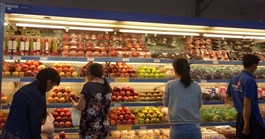Foreign partners increasingly look for cooperative opportunities with Vietnamese enterprises
Foreign partners increasingly look for cooperative opportunities with Vietnamese enterprises
In early August, a group of four representatives from an Australian company visited factories operated by THACO Industries, a subsidiary of Truong Hai Auto Corporation (THACO), in Quang Nam Province, central Vietnam, hoping to ink a cooperative deal with the Vietnamese enterprise.

THACO’s growth in recent years is owed to the expansion of its mechanical and spare parts businesses, which have enabled it to gain a foothold in markets across Southeast Asia, South Korea, Japan, the U.S., Australia, and Europe.
From doubts to deals
After touring THACO’s factories in Chu Lai, Quang Nam Province, the Australian representatives shared their positive impressions of THACO’s professionalism and expertise, adding that the firm exceeded their expectations.
The employees seemed happy, which shows that THACO likely has a very good working environment and culture, the leader of the Australian delegation explained, adding that THACO’s operations are on par with global standards.
Jim Fawkes, a member of the group, shared that they went to Chu Lai Open Economic Zone in Quang Nam on the hunt for a supplier of mechanical parts, and THACO Industries seemed to fit the bill thanks to its expansive manufacturing capabilities and lean production.
THACO Industries currently cooperates with dozens of partners from around the globe, many of whom initially doubted the Vietnamese manufacturer’s capabilities, but have since been impressed with its mechanical processing products, semi-trailers, and spare parts.
These products of THACO Industries have won the heart of not only partners in Asia, namely South Korea and Japan, but also the U.S., Australia, and Canada.
One of these partners includes a U.S. semi-trailer rental and distribution company that toured THACO’s facilities in 2020, according to Do Minh Tam, general director of THACO Industries.
Previously, the company had not considered moving its production away from China, but since the U.S.-China trade war erupted, they lost the competitive edge and began seeking out alternatives.
As soon as he arrived at THACO, the American partner was immediately impressed and went on to propose a negotiation meeting and send samples to the U.S. for evaluation. The results were better than expected.
The visit resulted in an inked contracted between THACO Industries and the American company and, by late 2020, THACO had shipped 33 semi-trailers to the U.S..
In December 2021, the American partner placed an order for 5,000 products to be shipped by 2024.
“There are still many difficulties ahead, but accessing a difficult market like the U.S. is a great success,” Tam said.
New technology and low labor cost
While touring factories of THACO Industries, foreign partners are typically on the lookout for modern technology that will help them boost competitiveness in the international arena.
According to the group of partners from Australia, mechanical enterprises in Vietnam need to quickly access the technology shift that is taking place across the world.
THACO Industries seems to be meeting this shift towards more advanced technologies, and other Vietnamese companies should follow suit by combining new technologies and low labor costs to obtain the advantage when entering the global market.
The shift of production facilities and supply chains, especially in mechanical and heavy industries, from developed countries to Southeast Asian, including Vietnam, is creating a lot of opportunities, said Huynh Quang Nhung, deputy general director of THACO Industries.
Many partners said that THACO Industries meets the conditions necessary to supply quality products on a large scale, and continued investment into technology and innovation is necessary in order to adapt, Nhung elaborated.
According to Tam, such competitiveness is a prerequisite for entering the global market.
To be able to compete, it is necessary to increase production capacity, while investment in core technologies and the application of automatic production lines will bring great advantages.
“For example, proper programming can make a laser cutting machine operate more efficiently which, in turn, boosts product quality and creates a competitive advantage,” the Tam explained.
THACO Industries always prioritizes such investment in technology despite its high cost, he added.


























